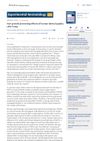Search
for
Sort by
Research
270-300 / 1000+ results
research Clascoterone as a Novel Treatment for Androgenetic Alopecia
Clascoterone may be a promising treatment for hair loss.

research Systematic Review on Synthetic and Herbal Medications for the Treatment of Alopecia
Combining synthetic and herbal treatments may help with hair loss, but more research is needed.

research Maximum Efficacy of Finasteride Is Obtained Within 6 Months and Maintained Over 6 Years
Finasteride works best in 6 months and lasts 6 years.

research Long-Term Safety and Efficacy of Dutasteride in the Treatment of Male Patients with Androgenetic Alopecia
Dutasteride safely promotes hair growth and reduces hair loss, with mild side effects.

research Investigational Medications in the Treatment of Alopecia
New treatments for hair loss are being developed using molecular biology.

research Finasteride
Finasteride effectively treats baldness but may cause sexual side effects.

research Potential Therapeutic Applications of Bee Venom on Skin Disease and Its Mechanisms: A Literature Review
Bee venom might be a good alternative treatment for various skin conditions because it has many healing properties.

research Androgenetic Alopecia: Therapy Update
There are many treatments for common hair loss, but more trials are needed to decide which are best.

research Minoxidil: A Comprehensive Review
Minoxidil effectively treats hair loss, especially androgenetic alopecia, but needs more research for better understanding.

research 28 Hair Restoration
Modern hair restoration techniques can effectively treat hair loss and provide natural-looking results.

research Managing Dermatologic Effects of Gender-Affirming Therapy in Transgender Adolescents
Gender-affirming therapy can cause skin issues like acne and hair loss in transgender adolescents, and more research is needed on its dermatological effects.

research Oral Presentations: Abstracts of the Urological Society of Australia and New Zealand Annual Scientific Meeting, Melbourne, Australia
Urologists should monitor mental health in patients taking finasteride due to potential links to suicidal thoughts, adjusting dosage or stopping use if necessary. More research is needed to confirm if finasteride causes these thoughts.
research Recurrence of Alopecia Areata in a Patient Receiving Etanercept Injections
Etanercept may not prevent alopecia areata from coming back.

research Exosomes Based Advancements for Application in Medical Aesthetics
Exosomes show promise for improving wound healing, reducing aging signs, preventing hair loss, and lightening skin but require more research and better production methods.

research Androgenetic Alopecia: An Update
Two drugs, finasteride and minoxidil, are approved for hair loss treatment, but new therapies are being developed.

research HIV, Fungal, and Infectious Diseases
The document concludes that various treatments for skin conditions are effective, but some require further research, and certain factors like gender and lifestyle can influence disease outcomes.

research Psoriasis, Acne, and Disorders of Keratinization
Treating psoriasis with UVB light three times a week is faster than twice a week, and certain medications and lifestyle factors affect psoriasis treatment outcomes.

research Do Kimchi and Cheonggukjang Probiotics as a Functional Food Improve Androgenetic Alopecia? A Clinical Pilot Study
Kimchi probiotics slightly improved hair density, but more research needed.

research A Phase I Safety Study of Topical Calcitriol (BPM31543) for the Prevention of Chemotherapy-Induced Alopecia: Final Study Results
Topical calcitriol (BPM31543) is safe for preventing hair loss from chemotherapy and shows some effectiveness.

research Promotion of Anagen, Increased Hair Density, and Reduction of Hair Fall in a Clinical Setting Following Identification of FGF5-Inhibiting Compounds via a Novel 2-Stage Process
New compounds were found to help increase hair growth and decrease hair loss.

research The Effect of Autologous Activated Platelet Rich Plasma Injection on Pattern Hair Loss: Clinical and Histomorphometric Evaluation
AA-PRP injections effectively increase hair count and thickness for male pattern hair loss.

research Industry Updates from the Field of Stem Cell Research and Regenerative Medicine in June 2019
In June 2019, the stem cell research field saw major progress, including new clinical trials, FDA approvals, and industry collaborations.

research Cancer
Some medications can improve skin conditions, while lifestyle factors like smoking and drinking may worsen them; treatments like monoclonal antibodies and imiquimod cream show promise for certain skin diseases.

research Comprehensive Overview of Rheumatology Studies: Ottawa, Ontario, Canada, February 13–16, 2013
The document concludes that various findings in rheumatology offer insights into disease severity, treatment responses, and potential risks in medication, with some limitations due to unspecified participant numbers.

research Hair Growth Promoting Effects of Human Dermal Papilla Cells in Pigs
Human dermal papilla cells can increase hair thickness and number in pigs with just one injection.

research Critical Analysis on Characterization, Systemic Effect, and Therapeutic Potential of Beta-Sitosterol: A Plant-Derived Orphan Phytosterol
Beta-sitosterol has potential health benefits but needs more research to fully understand its effects and improve its use in treatments.

research Clinical and Histological Study of Permanent Alopecia After Bone Marrow Transplantation
Permanent hair loss after bone marrow transplant can be caused by chemotherapy or chronic graft-versus-host disease.

research A Randomized, Double-Blind, Vehicle-Controlled Clinical Study of Hair Regeneration Using Adipose-Derived Stem Cell Constituent Extract in Androgenetic Alopecia
ADSC-CE treatment safely increases hair density and thickness in androgenetic alopecia patients.

research 308-Nanometer Excimer Light Therapy for Alopecia Universalis Resistant to Other Treatments: A Clinical Study of 11 Patients
308-nm excimer light therapy helped over a third of treatment-resistant alopecia universalis patients regrow most of their hair.